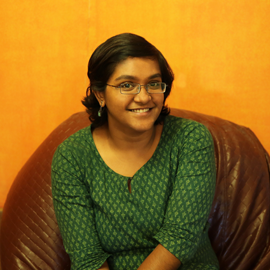
Each time I talk to people about the music festival scene in India, one of two things happens - I either shut up after five minutes because mostly people want to talk about their festival experience and which band they know personally, or I start talking about my issues with the 'scene' in India, and am swiftly-if-subtly phased out of the conversation.
Rightly so, perhaps.
I often let my feminist flag fly, much to the annoyance of those around me just trying to have a good time, yo.
I'm reminded often of this great New Inquiry article about how, even in 2015, we continue to assume certain things about women in music, even in the seemingly more liberal, more accepting space that is 'indie'.
"Girls' limited access to equipment and encouragement is often cited as the reason for the disproportionately low number of women in music, but the male-dominated sphere of music journalism also imposes discrete critical standards upon women."
This is abundantly true in India.
Women constitute a substantial portion of the fanbase, of the audience that forks over thousands of rupees to support independent music in the country.
But on stage, there are few they can relate to, and certainly fewer musicians than there are female singers.
Don't believe me? I decided to do an arithmetic experiment. I chose NH7 only because they have the largest reach of any festival in India, playing now in six cities. They also have insanely long lineups, so the best chance of diversity lay there.
Unfortunately, no.
I knew the numbers would be bad, but this bad?
301 men. 24 women.
I'm not making this up. There's a gender problem in indie music, and no matter how many music festivals sprout up and how much money flows into coffers, this is something we need to talk about.
I'm not saying it's sexism, I'm not saying it's overt misogyny. I'm saying sometimes gender disparity is subtle, tricky and more deeply embedded than you thought.
We need to work harder to make music spaces both more available to and comfortable for women. In the mid-90s, singer-songwriter Sarah McLachlan started an all-women music festival, Lilith Fair, for the precise reason that concert organisers and promoters were afraid of too many women on the lineup.
I'll let Wikipedia take it from here:
In 1997, Lilith Fair garnered a $16 million gross, making it the top-grossing of any touring festival. Among all concert tours for that year, it was the 16th highest grossing.
But, naysayers will say, maybe there just aren't that many good female musicians; this was, in fact, said to me by someone while I was researching the numbers for this story. By a man, in case you were wondering.
Or maybe there are women in music, but they're just Bollywood singers or sing pretty, but don't really make music - is also something I've heard enough number of times to have made a drinking game of it.
If you really believe that, there's nothing I can do to convince you otherwise.
To the others, I know we all care about music and the burgeoning indie music in the country to want it to be really good.
Here's what will make it really good: inclusiveness. Affirmative action. (By the way, for those looking to scratch more than the surface, this doesn't even touch upon the other big issue to contend with in the scene - class.)
As musicians, music producers, event organisers, writers and fans - we owe it to ourselves to have this conversation.








![BJP's Kapil Mishra recreates Shankar Mahadevan’s ‘Breathless’ song to highlight Delhi pollution [WATCH] BJP's Kapil Mishra recreates Shankar Mahadevan’s ‘Breathless’ song to highlight Delhi pollution [WATCH]](https://images.catchnews.com/upload/2022/11/03/kapil-mishra_240884_300x172.png)

![Anupam Kher shares pictures of his toned body on 67th birthday [MUST SEE] Anupam Kher shares pictures of his toned body on 67th birthday [MUST SEE]](https://images.catchnews.com/upload/2022/03/07/Anupam_kher_231145_300x172.jpg)






